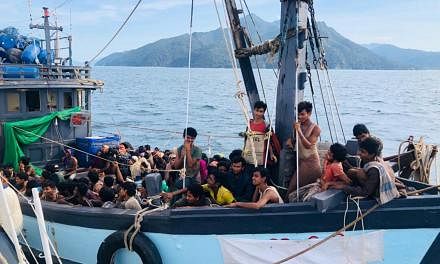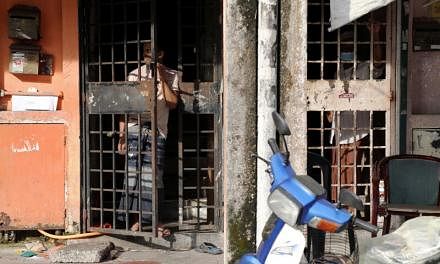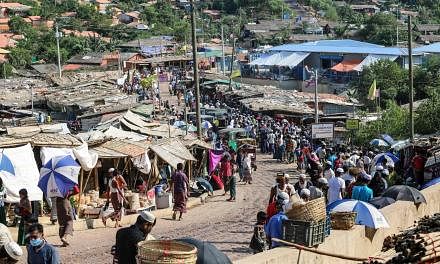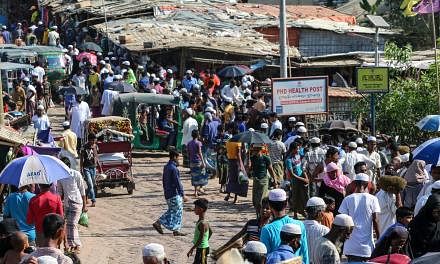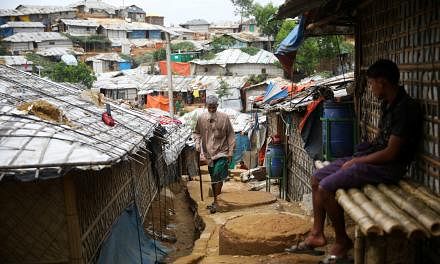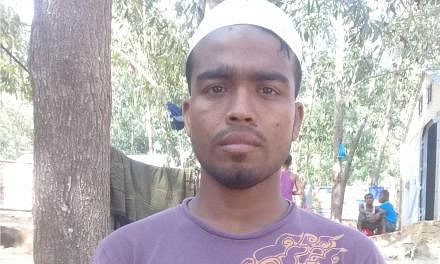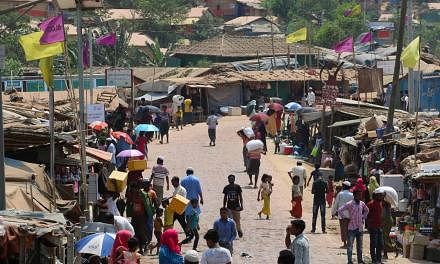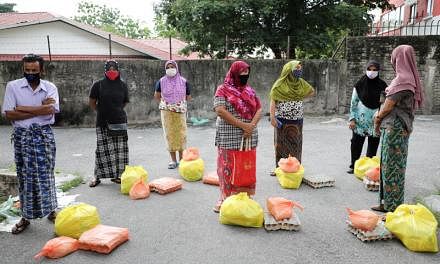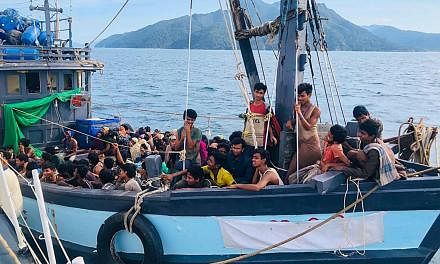Nobody's people: Uncertain future for Rohingya refugees in Bangladesh
The Sunday Times visits Cox's Bazar in Bangladesh, now grappling with an influx of 429,000 Rohingya refugees from Myanmar. They face an uncertain future even as the arrivals unsettle some of the locals.

The long and winding road from Bangladesh's south-eastern tip to its premier honeymoon spot Cox's Bazar is now more of a gauntlet.
It is lined with women cradling half-naked babies and soothing matted-haired children while they try to trek tens of kilometres inland to refugee camps. Their eyes plead through their niqab and their hands reach out to passing vans they are not allowed to travel in.
Expelled by violence in Myanmar, the Rohingya Muslims now face an uncertain future in one of the world's most crowded countries.
"Bangladesh is not a rich country... but if we can feed 160 million people, another 500 or 700,000 people, we can do it," Prime Minister Sheikh Hasina declared last week.
But the Bangladeshis are anxious.
"In 2016, about 364,000 illegal migrants crossed the Mediterranean and the world knows the implication of that," said Bangladesh's State Minister for Foreign Affairs Mohammed Shahriar Alam.
But 429,000 refugees arrived in Bangladesh in less than one month, between Aug 25 and Sept 20, according to the Inter Sector Coordination Group. "That's the enormity," Mr Alam tells The Sunday Times. "That's the pressure the local administration is facing. And obviously, they are struggling to cope."
The influx of refugees seemed to have come to a stop. Yesterday, Bangladeshi officials said border guards have not seen any Rohingya coming into the country in the past few days.
Bangladesh is no stranger to the Rohingya - it has already taken in some 300,000 refugees who sought shelter from earlier bouts of violence in Myanmar's Rakhine state. They are not recognised by Naypyitaw as an ethnic group, but seen as illegal "Bengali" migrants from present-day Bangladesh.
Yet, the sheer scale of the most recent exodus - triggered by an Aug 25 Rohingya insurgent attack and subsequent military crackdown - is starting to unsettle Cox's Bazar locals.
"We are keeping a low profile because of this new influx," Ms Rajuina Rahman, a programme associate at a World Food Programme in Cox's Bazar, told The Sunday Times, as refugees swarmed around an aid worker with their ration cards. "Many local people are scared because the Rohingya numbers are higher than before. They are scared of (the inflation it may cause)."
In the Teknaf area of Cox's Bazar, locals say the prices of vegetables have doubled.
For now, sympathy is outweighing fear. Locals hand out packets of potato crackers to passing Rohingya children. At Shapuri Dip, a common landing site, new arrivals wait by the jetty for donors to sponsor their onward journey. One of them was Ms Imtaz Begul, 20, a former resident of Myanmar's Maungdaw township, who cradled her feverish, semi-conscious infant son, who was wheezing with each breath.

Locals say they now avoid eating fish from the Naf river, where scores of fleeing Rohingya have drowned after overcrowded boats capsized while trying to cross to Bangladesh.
They exchange notes on the plumes of smoke they see going up across the waterway. Myanmar's security forces have been accused of working with ethnic Rakhine villagers to set Rohingya villages on fire. Naypyitaw denies this and alleges instead that the Rohingya are burning their own homes.
Over in Bangladesh, the main road that runs through many refugee settlements is clogged with trucks bearing aid from local politicians and companies, and banners proclaiming "genocide" in Myanmar. Many make random stops by the road to distribute food, clothes or other materials, sometimes sparking near accidents as the refugees surge forward. Hungry children go up close to vehicles backed up in the traffic queue and peer through their windows.
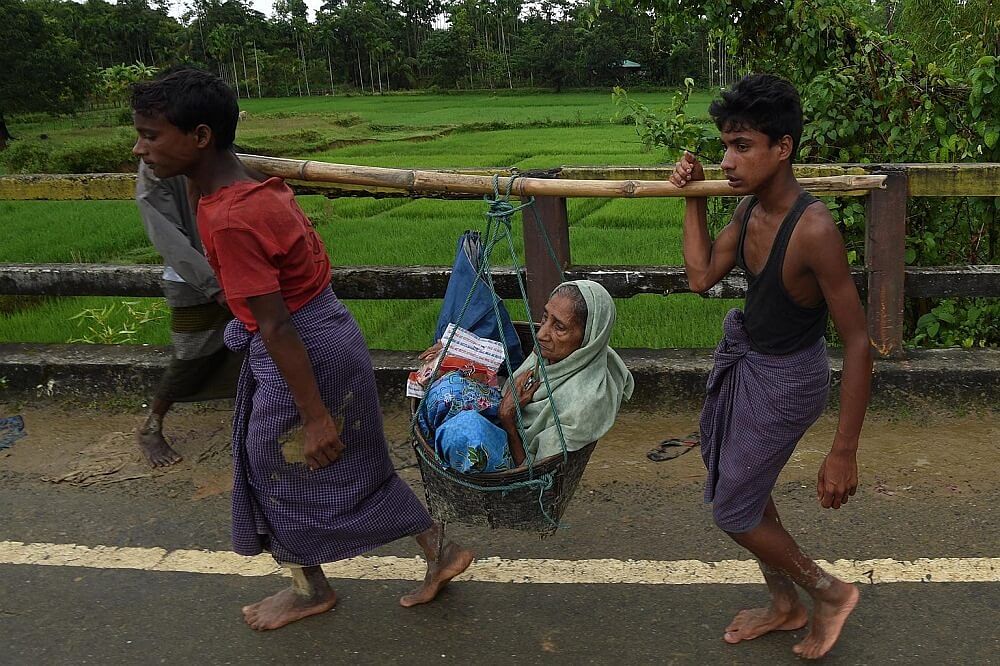
Banners declaring "Sheikh Hasina is the Mother of Humanity" flutter in prominent corners.
The police have imposed travel restrictions on the refugees, and told local bus and lorry drivers not to transport the Rohingya. Police checkpoints along the road make it difficult for the refugees to enter the tourist area in Cox's Bazar, which is packed with hotels and resorts.
"Cox's Bazar is a tourist town. If you have large numbers begging on the streets, you might have some sort of backlash," explained Mr Chris Lom, a regional communications officer at the International Organisation for Migration.

Dhaka, meanwhile, has allocated some 809ha of land for the erection of new facilities for refugees. The United Nations estimates that US$200 million (S$273 million) would be needed over the next six months to help the Rohingya.
"We can't plan too far in the future because it becomes a self-fulfilling prophecy," the UN resident coordinator for Bangladesh, Mr Robert Watkins, tells Reuters. "On the one hand, politically, it sends a strong signal, which we don't want to send, which is that people are going to be here for a long time."
Current conditions seem to rule out any quick return. While Myanmar's de facto leader Aung San Suu Kyi says her country is ready to start verifying individuals for repatriation, many Rohingya fled in such a panic, they do not have documents. Their homes have been reduced to ashes.

Hostility towards the Rohingya remains strong. Last Wednesday, Buddhist protesters in Rakhine state threw petrol bombs to try to block a Red Cross aid shipment they thought was meant only for the Rohingya.
In Cox's Bazar, a Rohingya refugee, who gave her name only as Mobina, told The Sunday Times that she would return to Myanmar only if she can live there without harassment. Her family had to abandon 8ha of land and four cows back in Myanmar. Now, she has to make her monthly rice ration of 50kg last for her family of seven.
Asked how she will cope, she looks down and replies: "Almighty will manage my meals."
After awhile, she adds: "I think I might have to beg."
Join ST's Telegram channel and get the latest breaking news delivered to you.
A version of this article appeared in the print edition of The Sunday Times on September 24, 2017, with the headline Nobody's people: Uncertain future for Rohingya refugees in Bangladesh. Subscribe

